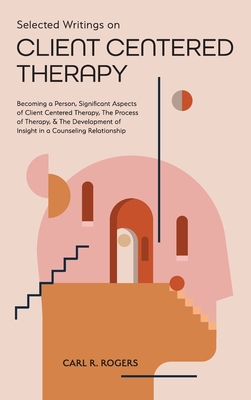Selected Writings on Client Centered Therapy: Becoming a Person, Significant Aspects of Client Centered Therapy, The Process of Therapy, and The Devel

Selected Writings on Client Centered Therapy: Becoming a Person, Significant Aspects of Client Centered Therapy, The Process of Therapy, and The Devel
In many ways, Carl Rogers was a revolutionary. Raised in a strict, conservative home, Rogers eventually developed a theory of psychology that swept away old power structures and put the patient in charge of his own treatment. His work continues to be important for what it teaches us about relationships and human potential, as well as about psychology. Unlike earlier practitioners of psychology, like Sigmund Freud or Carl Jung, Rogers did not elaborate a unifying theory of human consciousness. His work is not focused on unconscious drives, collective memory, or hidden impulses. It does not dwell on childhood memories or on sexuality, unless the patient (or, to use Rogers' own word, the client) wants to dwell on those matters. Instead, Rogers focused on what he called the desire for self-actualization. He believed that by creating the right conditions, therapy could release people from whatever was holding them back so that they could discover their true selves and live in harmony with the world around them.
Rogers is probably best known for developing what he called nondirective, or client-centered therapy. He argued that people were innately good and possessed the ability to heal themselves, even when they had become seriously disconnected from reality. However, this sort of healing couldn't occur in a vacuum. Rogers stressed the importance of therapeutic relationships to give people the confidence and freedom to develop, so that they could achieve their true potential.
Rogers wrote extensively about the difference between his therapeutic approach and older approaches. The traditional psychologist-centered approach, he argued, was bound to be problematic. Its top-down method did not give patients space to really understand their own fears and blind spots, or to come to terms with the kinds of changes they needed to make in their lives.
The top-down method is futile, Rogers explained, because whatever insights the therapist presented to his client would not really sink in. If a person is to truly integrate a new set of ideas, he must be ready for them - which often means that he must come to those ideas on his own, after a long period of gradually letting down his defenses. That is why the client-centered approach begins with a relationship, as Rogers explains: "If I can provide a certain type of relationship, the other person will discover within himself the capacity to use that relationship for growth, and change and personal development will
PRP: 165.25 Lei
Acesta este Prețul Recomandat de Producător. Prețul de vânzare al produsului este afișat mai jos.
148.72Lei
148.72Lei
165.25 LeiLivrare in 2-4 saptamani
Descrierea produsului
In many ways, Carl Rogers was a revolutionary. Raised in a strict, conservative home, Rogers eventually developed a theory of psychology that swept away old power structures and put the patient in charge of his own treatment. His work continues to be important for what it teaches us about relationships and human potential, as well as about psychology. Unlike earlier practitioners of psychology, like Sigmund Freud or Carl Jung, Rogers did not elaborate a unifying theory of human consciousness. His work is not focused on unconscious drives, collective memory, or hidden impulses. It does not dwell on childhood memories or on sexuality, unless the patient (or, to use Rogers' own word, the client) wants to dwell on those matters. Instead, Rogers focused on what he called the desire for self-actualization. He believed that by creating the right conditions, therapy could release people from whatever was holding them back so that they could discover their true selves and live in harmony with the world around them.
Rogers is probably best known for developing what he called nondirective, or client-centered therapy. He argued that people were innately good and possessed the ability to heal themselves, even when they had become seriously disconnected from reality. However, this sort of healing couldn't occur in a vacuum. Rogers stressed the importance of therapeutic relationships to give people the confidence and freedom to develop, so that they could achieve their true potential.
Rogers wrote extensively about the difference between his therapeutic approach and older approaches. The traditional psychologist-centered approach, he argued, was bound to be problematic. Its top-down method did not give patients space to really understand their own fears and blind spots, or to come to terms with the kinds of changes they needed to make in their lives.
The top-down method is futile, Rogers explained, because whatever insights the therapist presented to his client would not really sink in. If a person is to truly integrate a new set of ideas, he must be ready for them - which often means that he must come to those ideas on his own, after a long period of gradually letting down his defenses. That is why the client-centered approach begins with a relationship, as Rogers explains: "If I can provide a certain type of relationship, the other person will discover within himself the capacity to use that relationship for growth, and change and personal development will
Detaliile produsului










